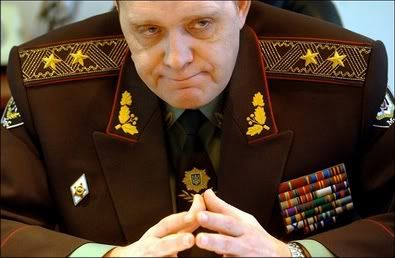How Top Spies in Ukraine Changed the Nation's Path
KIEV - As protests here against a rigged presidential election overwhelmed the capital last fall, an alarm sounded at Interior Ministry bases outside the city. It was just after 10 p.m. on Nov. 28.
More than 10,000 troops scrambled toward trucks. Most had helmets, shields and clubs. Three thousand carried guns. Many wore black masks. Within 45 minutes, according to their commander, Lt. Gen. Sergei Popkov, they had distributed ammunition and tear gas and were rushing out the gates.
More than 10,000 troops scrambled toward trucks. Most had helmets, shields and clubs. Three thousand carried guns. Many wore black masks. Within 45 minutes, according to their commander, Lt. Gen. Sergei Popkov, they had distributed ammunition and tear gas and were rushing out the gates.

James Hill for The New York Times
Lt. Gen. Sergei Popkov, commander of the Interior Ministry's troops, was ready to confront protesters, but a clash was averted.
Lt. Gen. Sergei Popkov, commander of the Interior Ministry's troops, was ready to confront protesters, but a clash was averted.
Kiev was tilting toward a terrible clash, a Soviet-style crackdown that could have brought civil war. And then, inside Ukraine's clandestine security apparatus, strange events began to unfold.
While wet snow fell on the rally in Independence Square, an undercover colonel from the Security Service of Ukraine, or S.B.U., moved among the protesters' tents. He represented the successor agency to the K.G.B., but his mission, he said, was not against the protesters. It was to thwart the mobilizing troops. He warned opposition leaders that a crackdown was afoot.
Simultaneously, senior intelligence officials were madly working their secure telephones, in one instance cooperating with an army general to persuade the Interior Ministry to turn back. (HERE)
While wet snow fell on the rally in Independence Square, an undercover colonel from the Security Service of Ukraine, or S.B.U., moved among the protesters' tents. He represented the successor agency to the K.G.B., but his mission, he said, was not against the protesters. It was to thwart the mobilizing troops. He warned opposition leaders that a crackdown was afoot.
Simultaneously, senior intelligence officials were madly working their secure telephones, in one instance cooperating with an army general to persuade the Interior Ministry to turn back. (HERE)

<< Home